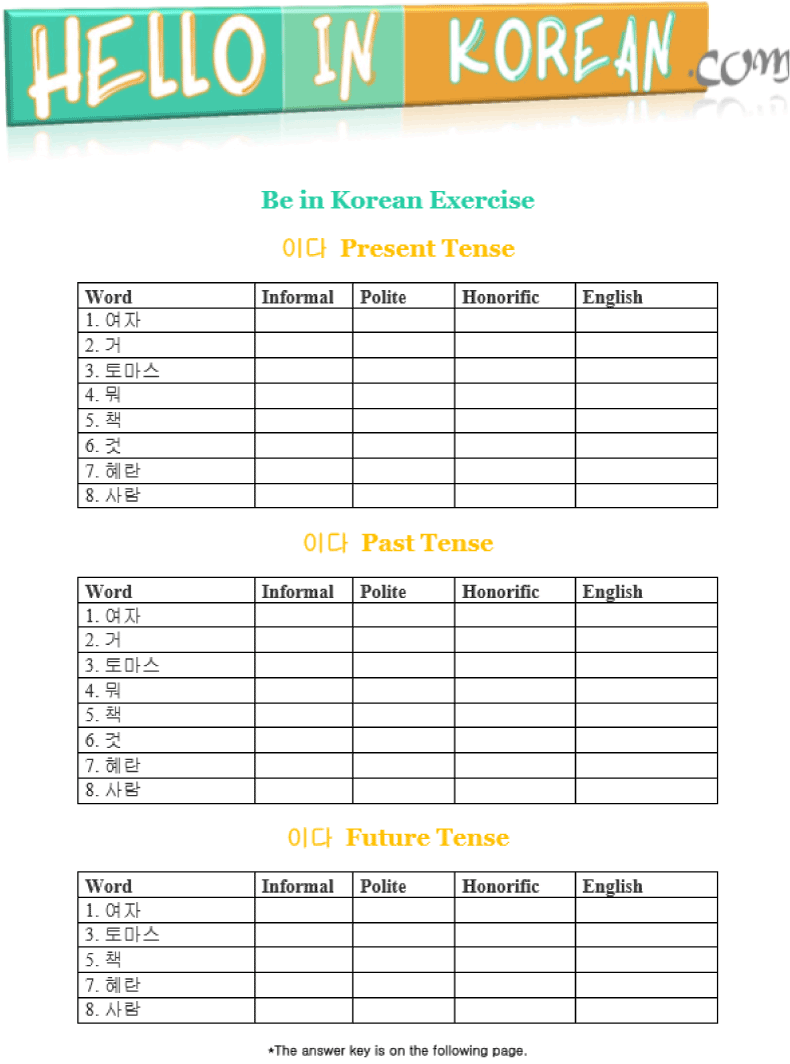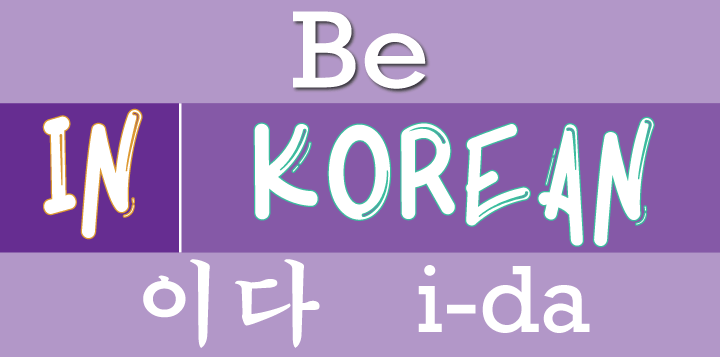Be in Korean
이다 is “Be” in Korean. 이다, has not been conjugated yet, the same way “Be” in English has not been conjugated yet. “Be” changes to “am/is/are” based on the subject of a sentence in English.
Ex. I am, He is, You are
이다 changes based on Korean honorifics and does not follow the normal conjugation rules.
이다, “Be” is also known as the copula.
Sentence structure:
Subject은/는 object이다.
I는 woman이다. = I am a woman.
Present Tense 이다 (Be in Korean)
Informal Level
Add -야 to words ending in a vowel.
| Word | 이다 ending | Word+이다 ending | Pronunciation | English Translation |
| 여자 | 야 | 여자야 | [여자야] | be/am/is/are a woman |
| 거 | 야 | 거야 | [거야] | be/am/is/are a thing |
| 토마스 | 야 | 토마스야 | [토마스야] | be/am/is/are Thomas |
| 뭐 | 야 | 뭐야 | [뭐야] | be/am/is/are what |
나는 여자야. = I am a woman.
나는 토마스야. = I am Thomas.
Add -이야 to words ending in a consonant.
| Word | 이다 ending | Word+이다 ending | Pronunciation | English Translation |
| 책 | 이야 | 책이야 | [채기야] | be/am/is/are a book |
| 것 | 이야 | 것이야 | [거시야] | be/am/is/are a thing |
| 혜란 | 이야 | 혜란이야 | [혜라니야] | be/am/is/are Hyeran |
| 사람 | 이야 | 사람이야 | [사라미야] | be/am/is/are a person |
이거는 책이야. = This is a book.
이사람 혜란이야. = This person is Hyeran.
Polite Level
Add -예요 to words ending in a vowel.
| Word | 이다 ending | Word+이다 ending | Pronunciation | English Translation |
| 여자 | 예요 | 여자예요 | [여자예요] | be/am/is/are a woman |
| 거 | 예요 | 거예요 | [거예요] | be/am/is/are a thing |
| 토마스 | 예요 | 토마스예요 | [토마스예요] | be/am/is/are Thomas |
| 뭐 | 예요 | 뭐예요 | [뭐예요] | be/am/is/are what |
나는 여자예요. = I am a woman.
나는 토마스예요. = I am Thomas.
Add -이에요 to words ending in a consonant.
| Word | 이다 ending | Word+이다 ending | Pronunciation | English Translation |
| 책 | 이에요 | 책이에요 | [채기에요] | be/am/is/are a book |
| 것 | 이에요 | 것이에요 | [거시에요] | be/am/is/are a thing |
| 혜란 | 이에요 | 혜란이에요 | [혜라니에요] | be/am/is/are Hyeran |
| 사람 | 이에요 | 사람이에요 | [사라미에요] | be/am/is/are a person |
이거는 책이예요. = This is a book.
이사람 혜란이예요. = This person is Hyeran.
Honorific Level
Add -입니다 to words ending in a vowel or a consonant.
-입니다 is pronounced as [-임니다]
| Word | 이다 ending | Word+이다 ending | Pronunciation | English Translation |
| 여자 | 입니다 | 여자입니다 | [여자임니다] | be/am/is/are a woman |
| 거 | 입니다 | 거입니다 | [거임니다] | be/am/is/are a thing |
| 토마스 | 입니다 | 토마스입니다 | [토마스임니다] | be/am/is/are Thomas |
| 뭐 | 입니다 | 뭐입니다 | [뭐임니다] | be/am/is/are what |
| 책 | 입니다 | 책입니다 | [채김니다] | be/am/is/are a book |
| 것 | 입니다 | 것입니다 | [거심니다] | be/am/is/are a thing |
| 혜란 | 입니다 | 혜란입니다 | [혜라님니다] | be/am/is/are Hyeran |
| 사람 | 입니다 | 사람입니다 | [사라밈니다] | be/am/is/are a person |
나는 여자입니다. = I am a woman.
나는 토마스입니다. = I am Thomas.
이거는 책입니다. = This is a book.
이사람 혜란입니다. = This person is Hyeran.
[mailmunch-form id=”322741″]
Past Tense 이다 (Be in Korean)
Informal Level
Add -였어 to words ending in a vowel.
~였어 is the contraction of ~이었어
| Word | 이다 ending | Word+이다 ending | Pronunciation | English Translation |
| 여자 | 였어 | 여자였어 | [여자였어] | was/were a woman |
| 거 | 였어 | 거였어 | [거였어] | was/were a thing |
| 토마스 | 였어 | 토마스였어 | [토마스였어] | was/were Thomas |
| 뭐 | 였어 | 뭐였어 | [뭐였어] | was/were what |
나는 여자여자였어. = I was a woman.
나는 토마스였어. = I was Thomas.
Add -이었어 to words ending in a consonant.
| Word | 이다 ending | Word+이다 ending | Pronunciation | English Translation |
| 책 | 이었어 | 책이었어 | [채기어써] | was/were a book |
| 것 | 이었어 | 것이었어 | [거시어써] | was/were a thing |
| 혜란 | 이었어 | 혜란이었어 | [혜라니어써] | was/were Hyeran |
| 사람 | 이었어 | 사람이었어 | [사라미어써] | was/were a person |
이거는 책이었어. = This was a book.
이사람 혜란이었어. = This person was Hyeran.
Polite Level
Add -였어요 to words ending in a vowel.
~였어요 is the contraction of ~이었어요
| Word | 이다 ending | Word+이다 ending | Pronunciation | English Translation |
| 여자 | 였어요 | 여자였어요 | [여자였어요] | was/were a woman |
| 거 | 였어요 | 거였어요 | [거였어요] | was/were a thing |
| 토마스 | 였어요 | 토마스였어요 | [토마스였어요] | was/were Thomas |
| 뭐 | 였어요 | 뭐였어요 | [뭐였어요] | was/were what |
나는 여자여자였어요. = I was a woman.
나는 토마스였어요. = I was Thomas.
Add -이었어요 to words ending in a consonant.
| Word | 이다 ending | Word+이다 ending | Pronunciation | English Translation |
| 책 | 이었어요 | 책이었어요 | [채기어써요] | was/were a book |
| 것 | 이었어요 | 것이었어요 | [거시어써요] | was/were a thing |
| 혜란 | 이었어요 | 혜란이었어요 | [혜라니어써요] | was/were Hyeran |
| 사람 | 이었어요 | 사람이었어요 | [사라미어써요] | was/were a person |
이거는 책이었어요. = This was a book.
이사람 혜란이었어요. = This person was Hyeran.
Honorific Level
Add -였습니다 to words ending in a vowel.
~였습니다 is the contraction of ~이었습니다
| Word | 이다 ending | Word+이다 ending | Pronunciation | English Translation |
| 여자 | 였습니다 | 여자였습니다 | [여자였습니다] | was/were a woman |
| 거 | 였습니다 | 거였습니다 | [거였습니다] | was/were a thing |
| 토마스 | 였습니다 | 토마스였습니다 | [토마스였습니다] | was/were Thomas |
| 뭐 | 였습니다 | 뭐였습니다 | [뭐였습니다] | was/were what |
나는 여자였습니다. = I was a woman.
나는 토마스였습니다. = I was Thomas.
Add -이었습니다 to words ending in a consonant.
| Word | 이다 ending | Word+이다 ending | Pronunciation | English Translation |
| 책 | 이었습니다 | 책이었습니다 | [채기었습니다] | was/were a book |
| 것 | 이었습니다 | 것이었습니다 | [거시었습니다] | was/were a thing |
| 혜란 | 이었습니다 | 혜란이었습니다 | [혜라니었습니다] | was/were Hyeran |
| 사람 | 이었습니다 | 사람이었습니다 | [사라미었습니다] | was/were a person |
이거는 책이었습니다. = This was a book.
이사람 혜란이었습니다. = This person was Hyeran.
Future Tense 이다 (Be in Korean)
The future follows the same conjugation as all other verbs.
Informal Level
Add ~일 거야 to the end of a noun.
| Word | 이다 ending | Word+이다 ending | Pronunciation | English Translation |
| 여자 | 일 거야 | 여자일 거야 | [여자일 거야] | will be a woman |
| 토마스 | 일 거야 | 토마스일 거야 | [토마스일 거야] | will be Thomas |
| 책 | 일 거야 | 책일 거야 | [채길 거야] | will be a book |
| 혜란 | 일 거야 | 혜란일 거야 | [혜라닐 거야] | will be Hyeran |
| 사람 | 일 거야 | 사람일 거야 | [사라밀 거야] | will be a person |
나는 여자일 거야. = I will be a woman.
나는 토마스일 거야. = I will be Thomas.
Polite Level
Add ~일 거예요 to a noun.
| Word | 이다 ending | Word+이다 ending | Pronunciation | English Translation |
| 여자 | 일 거예요 | 여자일 거예요 | [여자일 거예요] | will be a woman |
| 토마스 | 일 거예요 | 토마스일 거예요 | [토마스일 거예요] | will be Thomas |
| 책 | 일 거예요 | 책일 거예요 | [채길 거예요] | will be a book |
| 혜란 | 일 거예요 | 혜란일 거예요 | [혜라닐 거예요] | will be Hyeran |
| 사람 | 일 거예요 | 사람일 거예요 | [사라밀 거예요] | will be a person |
이거는 책일 거예요. = This will be a book.
이사람 혜란일 거예요. = This person will be Hyeran.
Honorific Level
Add ~일 것입니다 to a noun.
| Word | 이다 ending | Word+이다 ending | Pronunciation | English Translation |
| 여자 | 일 것입니다 | 여자일 것입니다 | [여자일 거심니다] | will be a woman |
| 토마스 | 일 것입니다 | 토마스일 것입니다 | [토마스일 거심니다] | will be Thomas |
| 책 | 일 것입니다 | 책일 것입니다 | [채길 거심니다] | will be a book |
| 혜란 | 일 것입니다 | 혜란일 것입니다 | [혜라닐 거심니다] | will be Hyeran |
| 사람 | 일 것입니다 | 사람일 것입니다 | [사라밀 거심니다] | will be a person |
이거는 책일 것입니다. = This will be a book.
이사람 혜란일 것입니다. = This person will be Hyeran.
Learn Korean Language Tips
The verb 되다, “Become” in Korean, is often used instead of 이다, “Be” in Korean, for the future tense.
“I will become a K-Pop idol.” and “I will be a K-Pop idol.” are nearly the same.
However, “I became a K-Pop idol.” and “I was a K-Pop idol.” are different.
The verb 이다, Be in Korean, is used to make the future tense. Click here to learn the future tense.
Be in Korean Exercise

Fill out the form below to download the answer key.
[mailmunch-form id=”322741″]


Leave a Reply
You must be logged in to post a comment.